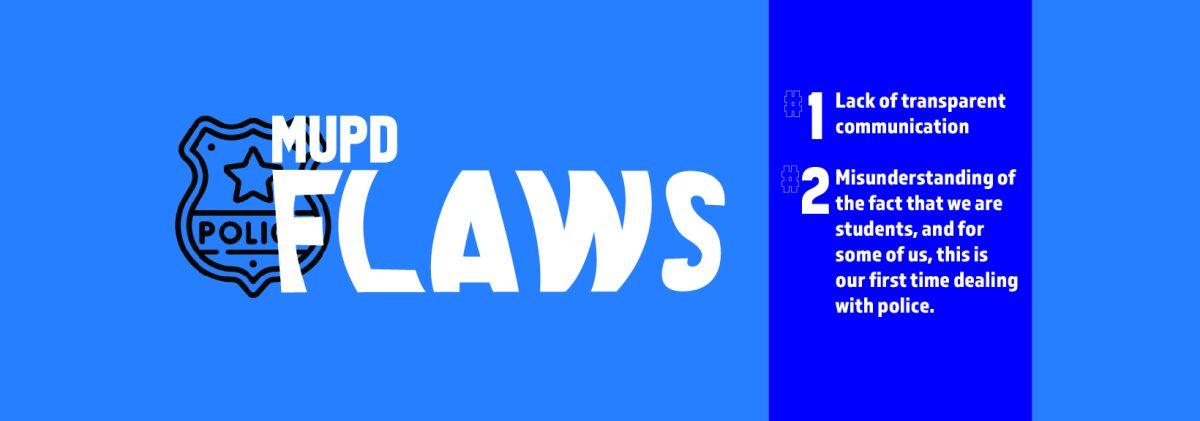They say patience is a virtue. My experience with MUPD left me questioning this age-old expression.
A few weeks ago, a stranger scammed me out of $300 after following me all the way down Stadium Boulevard while honking and flashing their lights. I immediately knew it was odd, but I continued driving home. I was stopped at a stop sign when they started yelling at me to pull over, and, reluctantly, I did. When I got out of my vehicle, they said my car had kicked up a rock that then hit theirs. They demanded I pay for it, and after at least 30 minutes of explanation — and no cops in sight— I was forced to pay them the $300 they asked for.
I was so shaken up by the whole interaction in the moment, I did not think to call the cops to the scene. I also know as a person of color, cops can be dangerous to interact with. The man who scammed me was Black, so I was hesitant to get the police involved. I later found out that 20 minutes after this person charged me on Venmo, they charged someone else for a car payment. Immediately, I knew I got scammed.
At this point, I needed to involve the police, so I called the Columbia Police Department, who forwarded me to MUPD.
It is important to note I was always skeptical of MUPD and their operations. Although their jurisdiction reaches downtown, they rarely inform students of important incidents — including the shooting near Silverball in October. Also, according to the MUPD website, each officer carries rifles, door-breaching materials, “less-lethal” shotguns, Tasers, body cameras and a fleet of vehicles equipped with cameras. All these weapons are simply unnecessary, especially for campus police. This left a sour taste in my mouth for the department. I feel as an organization that is put in place to serve students, they don’t do their best to protect us. They must do better.
There were a lot of problems with reporting this crime to them. My case was first directed to one police officer who was on duty the night of the incident, which was a Wednesday. He tried to identify the suspect, but did not succeed. I then tried to reach out on Thursday and was told by the secretary this officer was out of office until the following Monday. At this point, I was already frustrated because he said he would reach out to me, and he never did.
Finally, on that Monday, I reached out again, only to find out my case was moved to a different officer. I had to re-explain the traumatizing encounter, and she stopped me in the middle of my explanation and said she knew the whole story. Yet again, I was told the department was working toward an investigation.
A few days passed, and when I asked for an update, they told me the case had been put into the lap of a detective. I had to explain the situation again. This detective and I corresponded for at least three weeks, at the end of which he told me there was nothing he could do, and the person who scammed me got away with it.
I understand there are specific legal issues that prevented my case from moving further. For instance, the other person who got scammed never responded to the detective’s calls and did not file their own case. However, the detective told me it would be a long investigation — at least six months.
It took this same detective three weeks to rule out my case.
It seemed like MUPD did not care to investigate this case fully. For an organization specifically created to keep students safe, they could do so much better. For example, instead of throwing legal jargon at me, they could connect me to an attorney who could help me and my case. We are college students, not lawyers. We do not have money to spend on attorneys or time to spend in court. There is very little incentive to ever seek justice and advocate for ourselves.
Second, MUPD does not seem to care about the emotional toll this incident had on me. They must do a better job of making sure the victim is safe and in a stable state of mind before they ask students to make big decisions, such as going to court. That is a big commitment for a full-time student.
Third, MUPD must do better communicating with students, whether that be in a more individual capacity, such as in cases like mine, or in terms of MU Alerts. I was the one who had to reach out to further my case. This is a ridiculous task for students, and MUPD is not at all helpful with communicating effectively.
The last thing the detective said to me after breaking the news that my case was being dropped was that he hopes that I will reach out to MUPD should there be any other emergencies. I do not think I will.
I can not say with confidence that I would ever feel safe in the hands of MUPD.
They say patience is a virtue. With MUPD and their lack of communication, patience is a waste of time.
Edited by Cayli Yanagida | [email protected]











